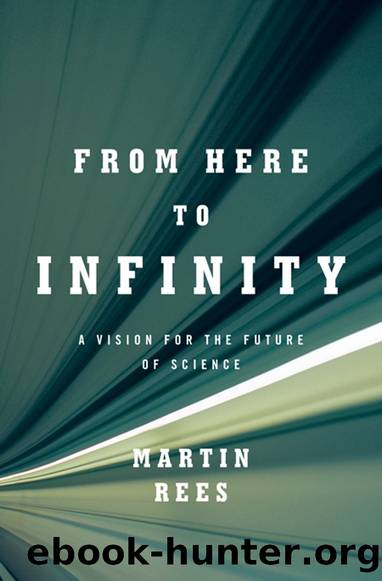From Here to Infinity: A Vision For the Future of Science by Martin Rees

Author:Martin Rees [Rees, Martin]
Language: eng
Format: epub
ISBN: 9780393083989
Google: aJVVMSKyqHIC
Amazon: 0393083985
Goodreads: 16175533
Publisher: W. W. Norton & Company
Published: 2012-05-23T05:00:00+00:00
3
WHAT WEâLL
NEVER KNOW
While struggling to prepare my lectures for BBC radio, I had a fantasy. Suppose I had a time machine. I could fast forward into the future, turn on the radio, listen to the broadcast version, take notesâand then reverse back to the present and start writing. Well, there was plainly no such quick fixâbut could there ever be?
Arthur C. Clarke noted that any sufficiently advanced technology is indistinguishable from magic. We canât now envision what artifacts might exist centuries hence, any more than a Roman could imagine todayâs SatNav and mobile phones. Nevertheless, a physicist would confidently assert that time machines will remain forever fiction. Thatâs because changing the past would lead to paradoxesâÂinfanticide would violate logic as well as ethics if the victim was your grandmother. So, what is the demarcation between concepts that seem crazy now but might be realized eventually and things that are forever impossible? Are there limits to how much we can ever predict? Are there scientific problems that will forever baffle usâphenomena that simply transcend human understanding?
Einstein averred that âthe most incomprehensible thing about the universe is that it is comprehensible.â He was right to be astonished. Our minds evolved to cope with life on the African savannah, but they can also comprehend the microworld of atoms and the vastness of the cosmos. We marvel at the fact that the universe isnât anarchicâthat atoms obey the same laws in distant galaxies as in the lab. Our cosmic horizons have vastly enlarged. Our Sun is one of a hundred billion stars in our galaxy, which is itself one of many billion galaxies in range of our telescopes. And this entire panorama emerged from a hot, dense beginning nearly 14 billion years ago. Some inferences about the early universe are as evidence-based as anything a geologist might tell you about the history of our Earth; we can make confident and precise statements about how hot and dense things were in the first few seconds of our universeâs expansion, even just a microsecond after the big bang. But, as always in science, each advance brings into focus some new questions that couldnât previously have even been posed. We now confront the mystery of the very beginning (if indeed there was one). Itâs a mystery because, right back in the first tiny fraction of a second, conditions would have been far hotter and denser than we can simulate in the lab. We donât know the physical laws that then prevailed, so we lose any foothold in experiment.
Einstein himself made one of the biggest advances in our comprehension. More than 200 years before him, Isaac Newton had shown that the gravity that makes apples fall is the same force that holds planets in their orbits. Einstein went much further. He didnât prove Newton wrongâNewtonâs mathematics is good enough to program space flights to distant planetsâbut he transcended Newton by offering insights into gravity that made it seem more natural and linked it to the nature of space and time, and the universe itself.
Download
This site does not store any files on its server. We only index and link to content provided by other sites. Please contact the content providers to delete copyright contents if any and email us, we'll remove relevant links or contents immediately.
Bad Pharma by Ben Goldacre(3420)
How To by Randall Munroe(3101)
The Book of Numbers by Peter Bentley(2962)
Aliens by Jim Al-Khalili(2825)
A Short History of Nearly Everything by Bryson Bill(2682)
The Meaning of it All by Richard Feynman(2347)
Bill Bryson by A short history of nearly everything(1706)
A Short History of Nearly Everything: Special Illustrated Edition by Bill Bryson(1671)
Elephants on Acid by Boese Alex(1599)
Six Easy Pieces by Richard P. Feynman(1521)
Everything in Its Place by Oliver Sacks(1482)
The Meaning Of It All by Richard P. Feynman(1449)
Glukhovsky, Dmitry - Metro 2033 by Glukhovsky Dmitry(1357)
Bad Science by Ben Goldacre(1321)
When Einstein Walked with Gödel by Jim Holt(1302)
The American Scene by Henry James(1243)
One Two Three ... Infinity: Facts and Speculations of Science by George Gamow(1236)
Leviathan Wakes by James S.A. Corey(1228)
A SHORT HISTORY OF NEARLY EVERYTHING by bryson bill(1200)
